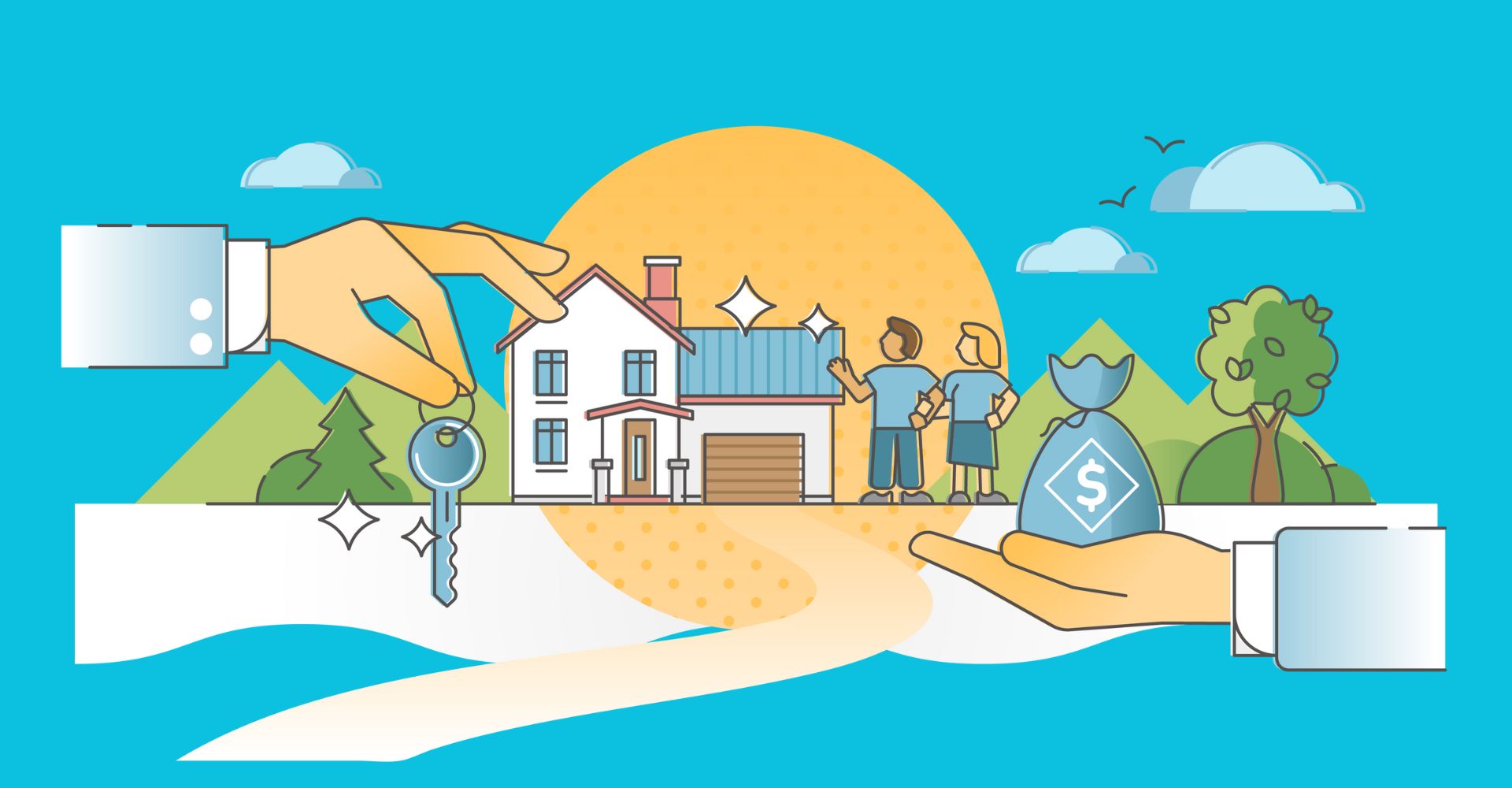Are you debating whether to get a 15-year or 30-year mortgage when buying your first house?
You’re not alone.
Many buyers struggle with this decision, and it can have a big impact on how quickly you build equity in your new home—not to mention the size of your monthly payments.
But don’t worry—we’ve got the answers to all of your questions about these two options right here!
In this blog post, we’ll cover what each term means, compare their pros and cons, and help you decide which type makes sense for you and your budget.
Read on for more info so you can make an informed decision today!
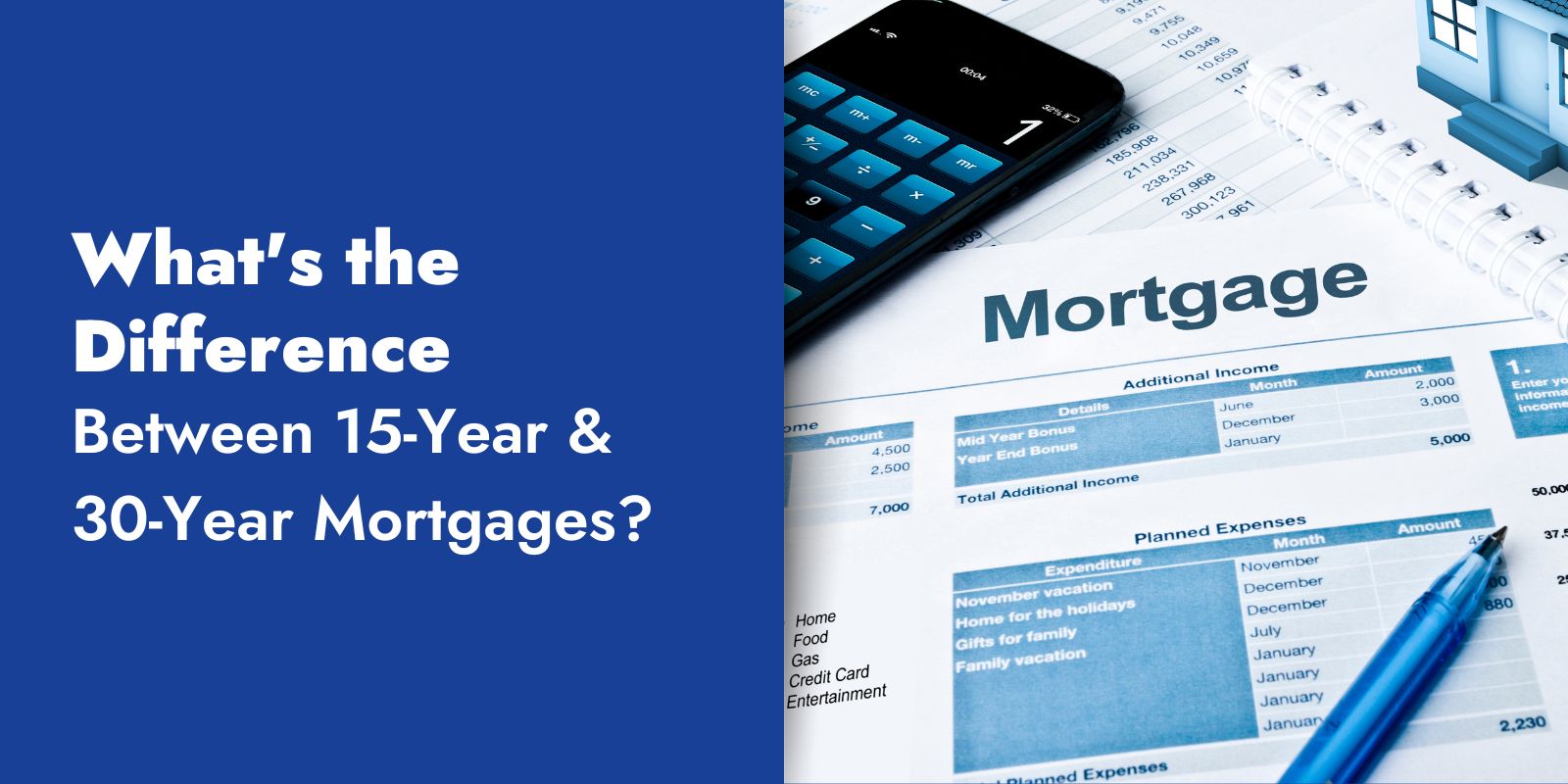
15-Year vs. 30-Year Mortgages: What’s the Difference?
When it comes to buying a home, most borrowers opt for a 30-year, fixed-rate mortgage.
It’s the standard lending practice that allows you to pay off the loan over a longer period, which helps lower the monthly payment.
But have you ever considered a 15-year mortgage?
Here’s the deal: with a 15-year mortgage, you can pay off your loan in half the time!
You just need to bump up the amount of your monthly loan payment.
The catch is that qualifying for a 15-year loan requires a higher income and lower debt-to-income ratio.
Why?
Because the monthly payments are higher.
So, if you’re able and willing to make a bigger monthly payment, a 15-year mortgage could be a great option.
It will save you a lot of money in interest and allow you to pay off your home faster.
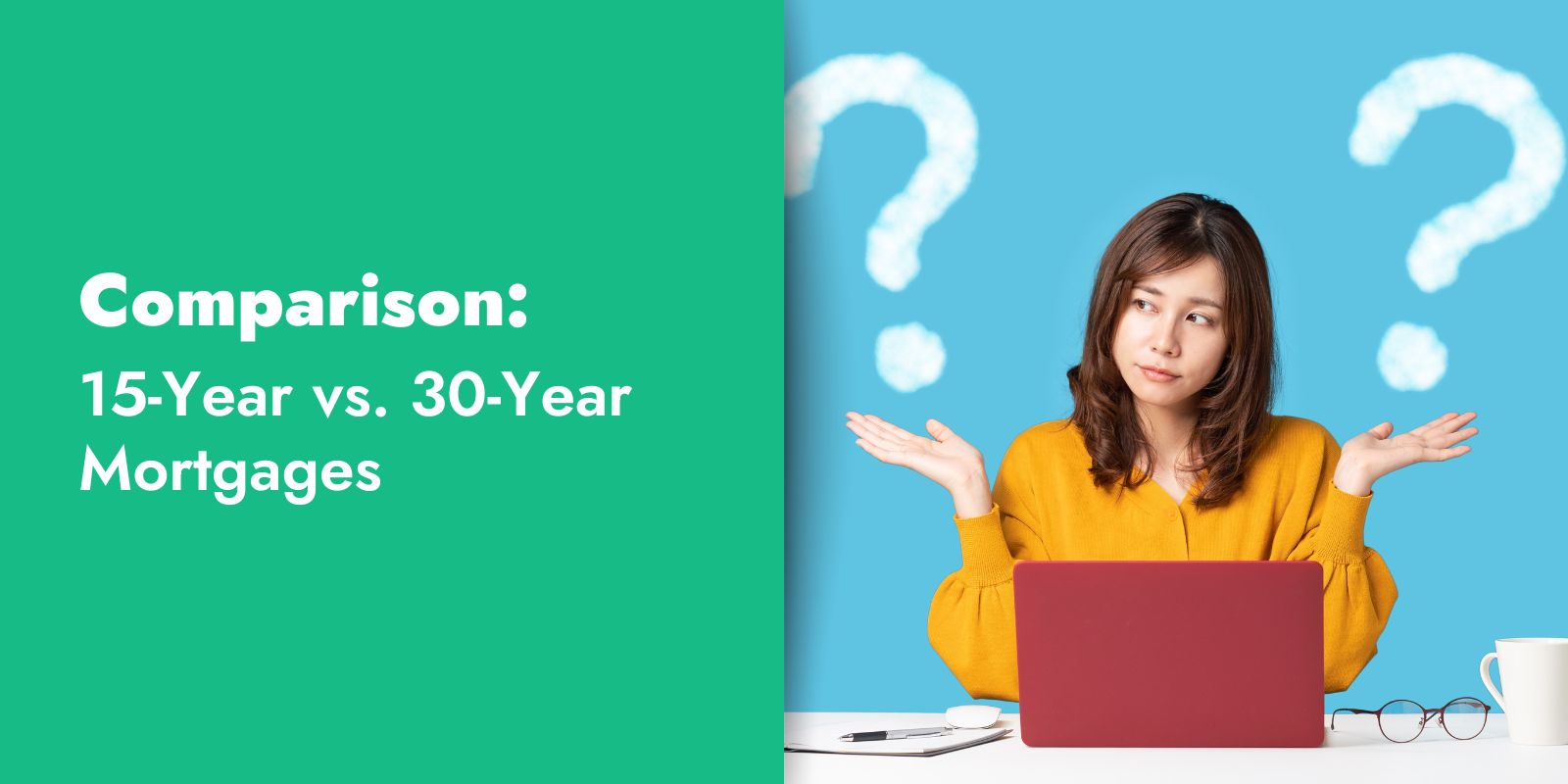
15-Year vs. 30-Year Mortgage Comparison
Let’s take a look at an example.
Suppose you want to buy a $400,000 house and have a 20% down payment ($80,000) saved up.
You need a mortgage for $320,000.
For the sake of simplicity, we’ll use a 3.5% interest rate for the 15-year mortgage and a 4% interest rate for the 30-year mortgage.
| Mortgage Term | Monthly Mortgage Payment | Total Interest Paid | Total Cost of Mortgage |
| 30-Year at 4% | $1,889 | $229,982 | $549,982 |
| 15-Year at 3.5% | $2,649 | $91,772 | $411,772 |
As you can see in the table above, the 30-year mortgage would cost $138,210 more than you’d pay with a 15-year mortgage.
While you’ll save $760 a month by choosing the 30-year mortgage, your interest rate will be higher and you’ll spend twice as much time in debt.
Though a 15-year mortgage might make the most sense on paper, a decision between the two term lengths depends on your individual situation.
You’ll need to evaluate your personal finances and understand your ability to keep up with payments.
Now that we’ve seen the difference in cost between 15-year and 30-year mortgages, let’s take a look at the advantages and disadvantages of each.
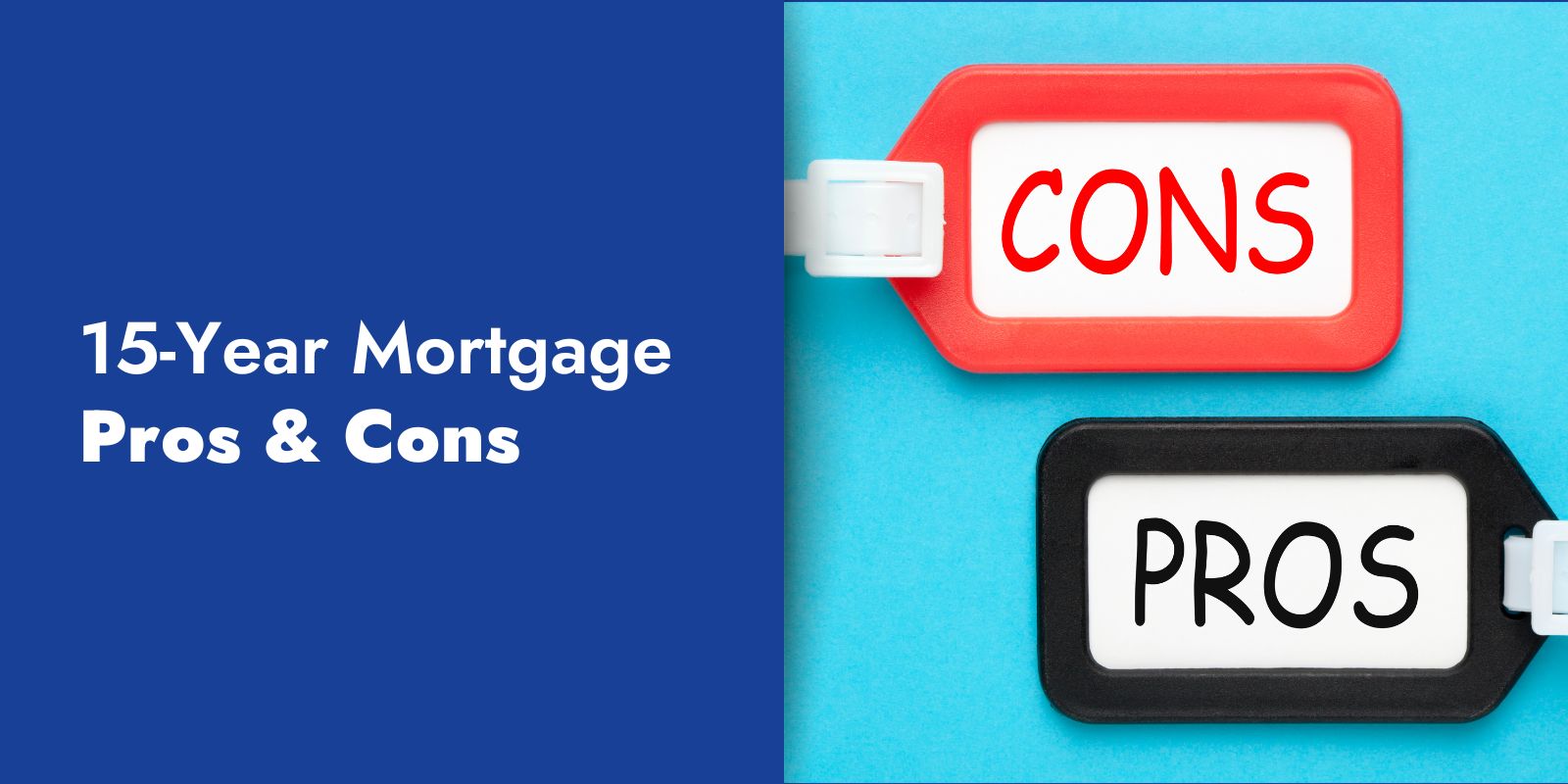
15-Year Mortgage Pros & Cons
First we’ll take a look at the advantages and disadvantages of a 15-year mortgage.
Pros of a 15-Year Mortgage
- Lower Interest Rate: Lenders typically charge lower interest rates on 15-year mortgages. This also means significant savings over the course of the loan.
- Own Your Home in 15 Years: With a 15-year mortgage you will own your home in half the time it would take with a 30-year mortgage.
- Save Thousands of Dollars: As in the example above, the 30-year mortgage would cost $138,210 more than you’d pay with a 15-year mortgage.
- Build Home Equity Faster: Making bigger monthly payments on a 15-year mortgage, you’ll pay down the interest a lot faster, which means more of your payment will go to the principal every month.
Cons of a 15-Year Mortgage
- Higher Monthly Mortgage Payment: Before opting for the 15-year mortgage, take an honest look at your finances and lifestyle. You don’t want your monthly mortgage payment to render you ‘house poor,’ with all of your money going to your house.
- Difficult to Qualify For: Because of the larger monthly payments required by 15-year home loans, they can be more difficult to qualify for. Lenders want to be sure that you have the ability to repay the loan.
- Smaller Loan Amount: With the higher monthly mortgage payment, lenders won’t qualify you for as large a loan with a 15-year mortgage. If your dream house is on the higher end of your affordability scale, you might not be able to choose a 15-year loan.
- Less Flexible Repayment: With a 30-year mortgage, you can pay it off faster if you have room in your budget. With a 15-year mortgage, you don’t have the option to pay it off slower if your finances change.
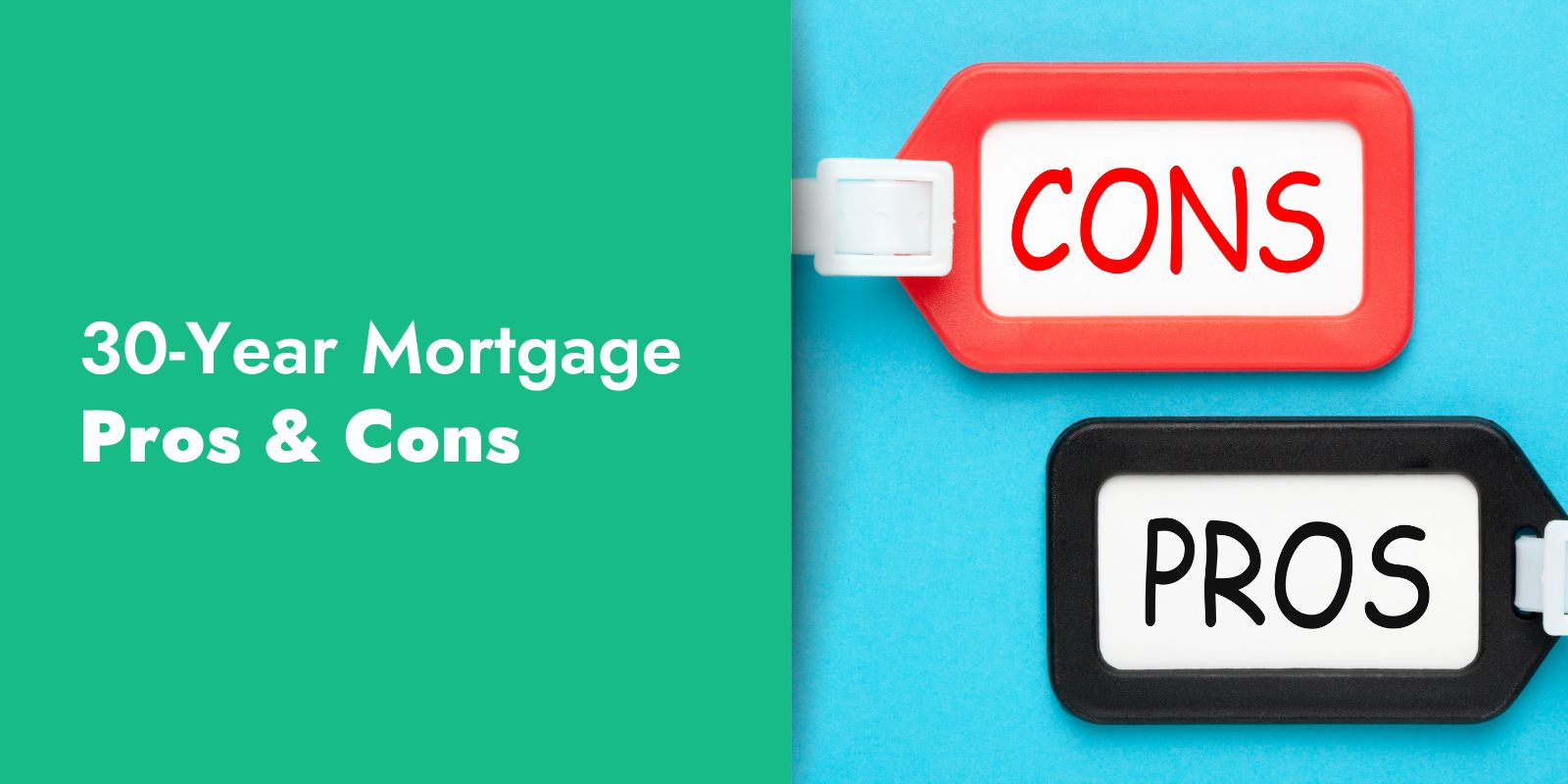
30-Year Mortgage Pros & Cons
Now let’s look at the advantages and disadvantages of a 30-year mortgage.
Pros of a 30-Year Mortgage
- Lower Monthly Payment: With the longer loan term, your monthly mortgage payment will be significantly lower. In the example above, the monthly payment on the 30-year mortgage was $760 less than the 15-year loan. The advantages of a lower monthly payment can’t be ignored. Budgets tend to fluctuate for many families. The costs of education, clothes, food, utilities, and a need to save and invest can all vary each month. A lower mortgage payment means you can put more away for retirement, college funds, and home repairs.
- Easier to Qualify: Lower monthly payments make it easier for you to meet DTI ratio requirements and qualify for a 30-year loan.
- Buy a Bigger House: A 30-year mortgage could allow you to afford a bigger house or larger property than a 15-year mortgage. If you need a bigger mortgage to buy a larger home, taking 30 years to pay it off would give you the freedom to make this purchase. It might not be possible if you only had 15 years to pay off the loan.
- Flexible Repayment Options: You’ll have a lower monthly payment and have the option to pay more each month if your finances take a positive turn.
Cons of a 30-Year Mortgage
- Higher Interest Rates: Lenders consider 30-year mortgages to be a greater risk and charge higher interest rates.
- More Interest Paid: Paying interest over a longer period of time means you’ll pay a lot more interest over the life of the loan.
- Build Equity Slower: Lower payments also mean you’re building equity less quickly. This could also prolong the time you have to pay for private mortgage insurance.
- Higher DTI Ratio: If you’re choosing a 30-year mortgage because it allows you to borrow more, your DTI will be higher. That can make your current loan more expensive and affect future loans.
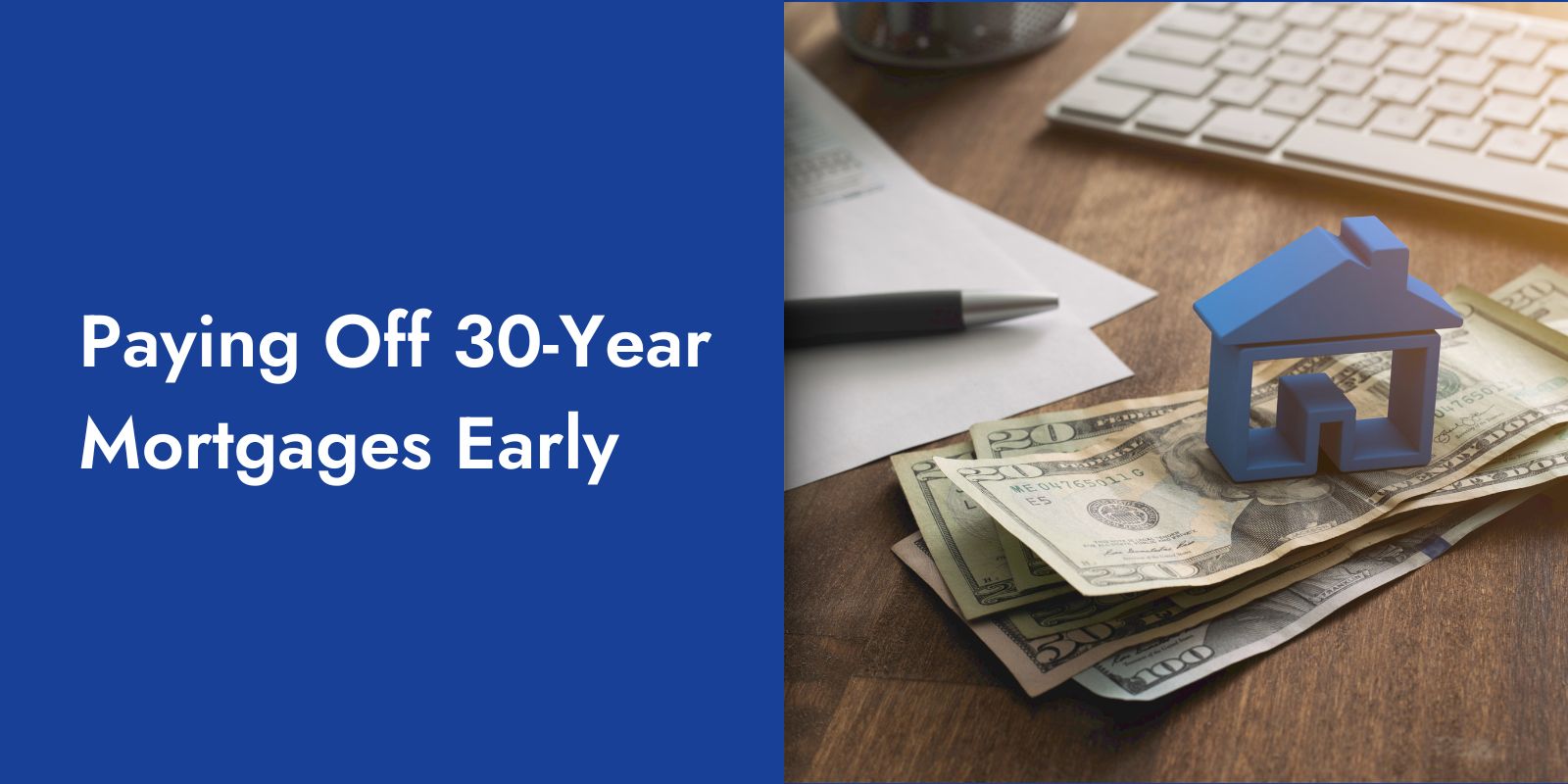
Options for Paying Off 30-Year Mortgages Early
Are you uncertain about committing to the higher payments of a 15-year mortgage but keen on the savings it offers?
Don’t worry!
You can still achieve a shorter term as long as there’s no prepayment penalty.
How?
By making extra payments towards the principal when your budget permits.
Now, it’s crucial to note that some lenders include prepayment penalties in their mortgage agreements.
Simply put, this means you’ll have to pay fees if you pay off your principal balance earlier than agreed upon.
But don’t fret!
You can always ask potential lenders about their prepayment penalty policies before committing.
This way, you can make an informed and rewarding decision for your mortgage plan.
Make Extra Payments
One great advantage of making additional payments is the flexibility it offers.
You can use extra amounts from a company bonus, a modest inheritance, or even unexpected savings to pay off your mortgage earlier.
In fact, small amounts can add up significantly.
You could keep a jar handy to collect those extra funds and put them towards making additional payments on your mortgage each month.
Don’t forget to inform your mortgage servicer that the extra payment should be applied to your principal.
This way, you can pay off your mortgage quicker and save money in the long run.
Make Bi-Weekly Payments
Did you know that by making biweekly mortgage payments instead of just one payment a month, you can save a sizeable amount on interest over time?
This strategy aligns with the payroll schedules for many workers, resulting in 13 payments per year instead of 12, meaning an extra full payment per year!
However, it’s worth noting that not all mortgage servicers provide this option.
It’s a good idea to double-check with your mortgage servicing company to see if they offer biweekly payments.
Refinance Your Mortgage
Looking for flexibility when it comes to your home’s mortgage?
Consider a 30-year term for lower monthly payments that you can refinance later on!
Five years from now, you might be earning more and ready to pay off your home faster.
By refinancing to a 15-year plan then, you’ll enjoy savings while avoiding financial strain.
In the end, you’ll come out ahead, having paid your mortgage off quickly and comfortably.
Consider a Mortgage Recast
A mortgage recast could come in handy if you find yourself with surplus cash that you would like to apply to your mortgage, thus lowering your monthly payments.
By making a large lump-sum payment, your lender will amortize your loan and adjust your monthly payments accordingly.
This option is great for those who’ve fallen into unexpected fortune, whether it’s an inheritance, a stroke of genius, or just plain old-fashioned good luck.

Questions to Ask Before Choosing a Mortgage
Before you decide on a 15-year or 30-year mortgage, there are a few important questions to ask.
Are There Prepayment Penalties?
Did you know that your lender may charge you a fee for repaying your mortgage early?
Fortunately, if your 30-year loan doesn’t have a prepayment penalty, you can pay it off more quickly without the pressure of a 15-year loan.
Even a little extra cash towards the principal balance can reduce the total amount of interest you’ll pay over time.
Be sure to ask if your mortgage includes a prepayment penalty before you close.
This small detail could make a big difference over the life of your loan.
Are the Fees Negotiable?
When you’re buying a home, you’ll inevitably face closing costs.
But did you know that you can actually negotiate with your lender to lower some of those costs?
That’s right!
Here are some options to consider:
Buy discount points: By paying an upfront fee, you can reduce your interest rate and save on interest costs over the life of your mortgage.
Ask about lender credits: The opposite of discount points, lender credits let you lower your closing costs by accepting a higher interest rate. This could be a great option if you’re struggling to cover closing costs after saving up for a down payment.
Remember, negotiation is key!
Don’t be afraid to ask your lender about these options and see if you can save some money on your home purchase.
Do I Want to Work With This Lender?
Choosing the right mortgage lender is essential, as you’ll be entering into a long-term business relationship with them.
Don’t commit to a mortgage if you aren’t comfortable with your lender or the terms of the loan.
Remember, you can shop around for lenders before making a final decision.

Wrapping up our Comparison of 15-Year vs. 30-Year Mortgages
In conclusion, we’ve explored the main differences between 15-year and 30-year mortgages.
Both offer pros and cons, so it really depends on your individual situation and financial goals.
Understanding all of the information you need to make an informed decision is key.
And if you are a homeowner with a 30-year mortgage, there are still plenty of options available for paying off your loan early.
Before making any decisions, be sure to speak with a professional who can provide you with the most current advice about the market and rates available now.
After all, doing your due diligence and getting sound financial advice could save you in the long run.
Finding a real estate agent that you can trust and rely on when buying or selling a home is essential.
Helen Painter Group Realtors is here to offer our expertise.
A long-standing and trusted Fort Worth real estate agency, we’ve been serving buyers and sellers since 1958.
With over six decades of success behind us, you’ll surely have peace of mind knowing your best interests are being represented each step toward buying or selling a home.
To learn more or speak with an agent, feel free to give us a call at (817) 923-7321 or contact us, we’d love to help!

